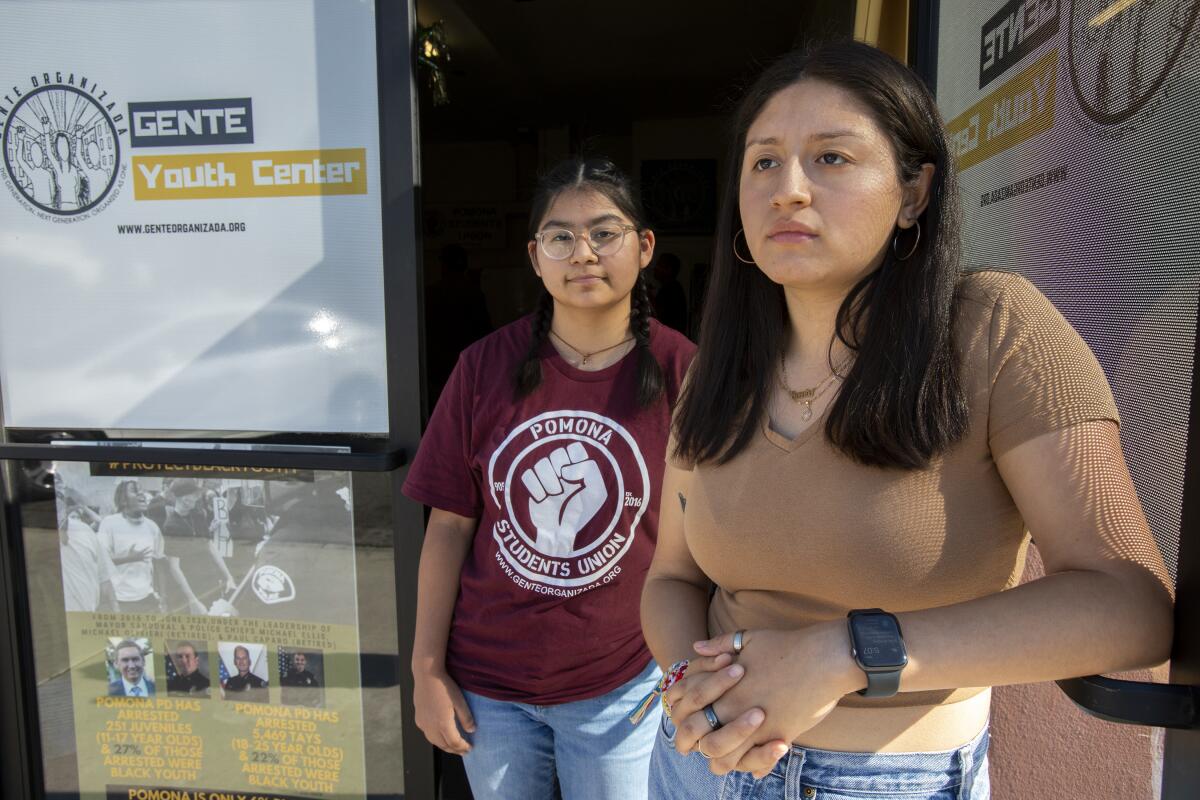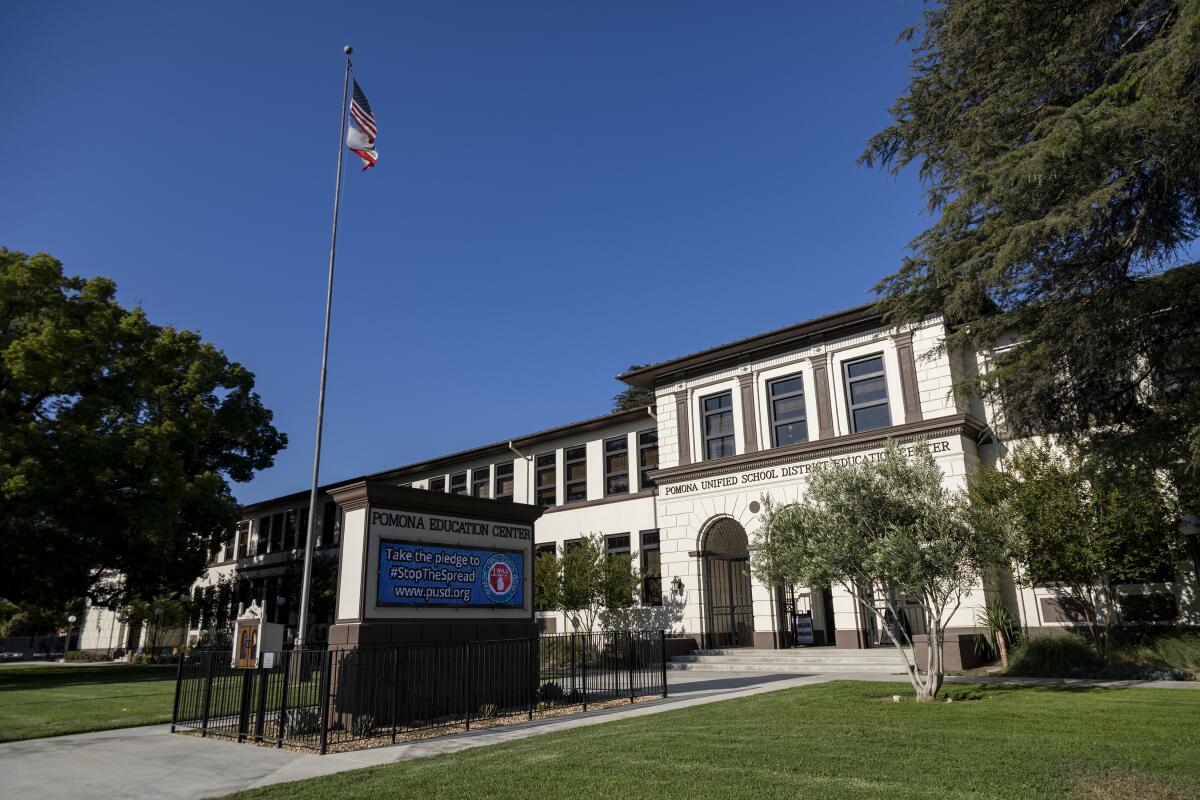Pomona school district defunds police, reimagines school safety

- Share via
After a four-year campaign by community activists, the Pomona Unified School District has decided to end on-campus police patrols and instead rely on proctors trained in de-escalation methods, joining a handful of California districts that have moved to defund school police.
The Pomona decision comes amid increased pressure from activists in Los Angeles and elsewhere to reimagine school policing and eliminate patrols on campus, which some say can be traumatizing for students. Others have maintained that school police play a crucial role in keeping schools safe. Last month, the Los Angeles County Board of Supervisors voted to reclaim its oversight authority to review Sheriff’s Department contracts with school districts.
“This is a milestone that has been met,” said Caroline Lucas, a Pomona youth organizer who advocated for the removal of officers at her school, Pomona High. “For me, it means that leaders can experiment with what transformative activists have been trying to do.”

The activist group Gente Organizada led the Pomona effort, which began in 2016 after a 16-year-old was the subject of a violent encounter with police officers at the Los Angeles County Fair in Pomona. The officers were acquitted in an excessive force case by a federal jury
“That was kind of the spark for this campaign,” said Jesus Sanchez, co-founder of Gente Organizada, or Organized People. “The students know that these officers are on their school campuses. They see them.”
The district, which serves 23,000 students, at one time contracted with Pomona police to station one uniformed officer at each of its four high school campuses.
In 2019, the district paid the Pomona police about $366,000 to fund two officers. The school board voted on a budget Wednesday that did not include a new contract with the Police Department. Instead, the money will fund resources to help students after a year of remote schooling, Supt. Richard Martinez said.
“Our focus has been about reengaging students and making sure that they’re ready to come back to school,” he said.
After Gente Organizada presented a report to school officials in April showing that Black and Latino youths were disproportionately arrested by the city’s Police Department, the district moved to end its more than decade-long relationship with the department, Martinez said. But the district will still call on law enforcement if the need arises, he said.
The district will prioritize the use of proctors, who are unarmed and work as security across all campuses, to de-escalate situations among students. Often, they are parents or recent graduates, Martinez said.
Aly Mejia, a spokesperson for the Pomona police, said the department has “always taken pride in the meaningful relationship we’ve established with our community and Pomona youth.”
“While [school resource officers] responded to calls at the various schools, they were mentors to many young children,” Mejia added.
Pomona Unified joins a short but growing list of school districts that have cut ties with police on campuses after a summer of racial justice protests that reignited the debate.
In California, at least six districts have approved efforts to eliminate school police or cut funding, according to a database compiled by the news organization Education Week. After the summer of 2020, when hundreds of thousands of people marched in the streets to protest the police killing of George Floyd, more communities challenged the role of officers in school systems.
For young people, their relationship with the police is a strained one, Sanchez said. Pomona has a large immigrant community, and for some, their first interaction with an officer was related to a family member being deported, Sanchez said.
Caroline, a rising junior at Pomona High School, got involved with Gente this year after being inspired by the summer marches. Defunding school police was important to her, she said, because she felt anxious or stressed when she saw uniformed officers on campus.
“It’s a feeling of fear. I don’t feel safe,” the 16-year-old said. “I want to run away from them even though I haven’t done anything.”
Brenda Gomez, who graduated from Pomona High School in 2018, expressed similar sentiments.
“Students become conditioned to believe that they’re doing something wrong or in a place where something bad is happening” when they see an officer on campus, Gomez said.
Amir Whitaker, senior policy counsel for the American Civil Liberties Union of Southern California, which often supports local efforts, said the civil rights organization has been “ringing the alarm” for years against police presence on campuses, but it took last summer for school districts to reconsider the effect of policing on students, Whitaker said. Defunding campaigns are continuing in other districts, including Antelope Valley and San Diego.
At least one California district recanted: The Fremont Unified School District in Alameda County voted to disband its school police program in November, only to reinstate it this year for $913,000. The decision came after parents called and emailed board members, saying police presence made their children feel safe, according to a news report of a meeting.
Still, the ACLU of Southern California has received several inquiries from organizers across the state who want to revisit school police and safety issues, Whitaker said.
“With the uprisings and the recent events that happened over the past year, students just don’t want to be greeted with police officers when they come back,” Whitaker said.
The shift in position by some teachers unions, including Los Angeles, has also helped, he said. Previously, without the support of a district’s teachers union, it was rare that a campaign would succeed.
“Educators acknowledge that the fight to remove school police is part of the fight for racial justice,” Whitaker said.
Though Los Angeles Unified, the second-largest district in the country, did not disband its school police force, it cut the police budget by more than a third last year. The decision to defund the force by $25 million followed a years-long campaign led by student advocacy groups. During budget debates by the school board last month, a move to further reduce the force failed.
Countywide, officials are moving to improve transparency on deputies in schools. The county Board of Supervisors voted last month to take back oversight authority from the Sheriff’s Department in negotiating contracts with districts.
After some board members expressed concern, Supervisor Holly Mitchell, who proposed the motion, emphasized that the oversight was typical of county contracts. The vote allows districts to retain the ability to hire school resource officers as well as use other county resources to support students’ social, emotional or mental health, Mitchell said.
The motion also included increasing data collection on the effect deputies have on school campuses so that districts can make informed choices on whether to renew contracts. Research has shown that the presence of school police can make some students feel unsafe, Mitchell said.
“While each student may have differing experiences and relationships with law enforcement … the research finds potential vulnerabilities that we must guard against,” Mitchell said. “The county, I believe, really must closely monitor the impact of school law enforcement services.”
More to Read
Sign up for Essential California
The most important California stories and recommendations in your inbox every morning.
You may occasionally receive promotional content from the Los Angeles Times.











